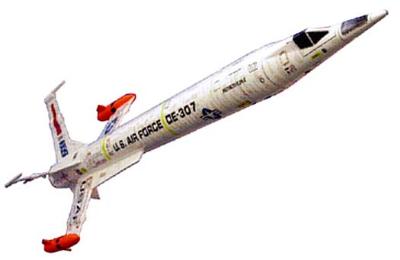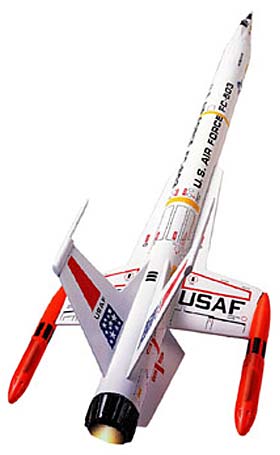| Construction Rating: | starstarstarstarstar_border |
| Flight Rating: | starstarstarstarstar_border |
| Overall Rating: | starstarstarstarstar_border |
| Diameter: | 2.00 inches |
| Length: | 39.00 inches |
| Manufacturer: | Estes  |
| Skill Level: | 3 |
| Style: | Futuristic/Exotic |
 Brief:
Brief:
Estes has done it again with this 150% upscale of the beloved K-50 Interceptor designed to fly on their black-powder "E" motors.
Construction:
The rocket kit was packed in Estes' traditional plastic bag with three-sided cardboard placard. It consisted of:
- two sections of 2" diameter white body tube (one of which is slotted)
- a big blow-molded plastic nosecone
- 24mm x 10" motor-mount tube
- thrust ring
- an E-length motor retainer hook
- tube coupler
- plastic tail cone
- two plastic centering rings
- two plastic launch lugs
- printed card shock cord mount
- engine spacer tube
- four sheets of laser-cut balsa for the fins
- 24" nylon parachute
- two wingtip pods in two injection-molded halves
- two antennas
- three huge decal sheets.
For the first time I can recall I had a part missing from an Estes kit. This one had one of the three decal sheets missing. As I write this, Estes Customer Service is probably working to fix the shortfall.
Great Estes instructions, as I expected. This is an actual 150% upscale of the recently re-released Interceptor. A fair lot of serious thought went into this design with the through-the-tube fin installation, the well-planned-out multi-panel fins and wings with reinforcing strips and the way the motor mount tube also serves as a "stuffer tube" to reduce recovery malfunctions due to high body volume.
 I did some modifications to the recovery harness and stuffer-tube motor mount, figuring this would be a wadding-intensive rocket otherwise. I used two 12" stainless-steel fishing leaders as a shock-cord mount - one I removed both swivel and snap from the ends of and attached at both ends to the top centering ring, the other I left stock and threaded onto the first. I also inserted one-quarter of a stainless-steel pot-scrubbing pad into the stuffer tube and capped it off with a conveniently-sized cap from a spritz bottle into which I drilled two quarter-inch holes for ejection-gas ports. I replaced Estes' included 36" black elastic shock cord with 48" of elastic shock cord from a tent-pole.
I did some modifications to the recovery harness and stuffer-tube motor mount, figuring this would be a wadding-intensive rocket otherwise. I used two 12" stainless-steel fishing leaders as a shock-cord mount - one I removed both swivel and snap from the ends of and attached at both ends to the top centering ring, the other I left stock and threaded onto the first. I also inserted one-quarter of a stainless-steel pot-scrubbing pad into the stuffer tube and capped it off with a conveniently-sized cap from a spritz bottle into which I drilled two quarter-inch holes for ejection-gas ports. I replaced Estes' included 36" black elastic shock cord with 48" of elastic shock cord from a tent-pole.
After all the upgrades to the recovery harness, my Interceptor-E tipped the scales at 10.5 ounces (not counting motor weight). The was probably due because I used CA gel instead of epoxy as recommended by the instructions. I filleted all the fins with Elmer's Carpenter's Wood Glue® as well and applied a coat of tube-type plastic cement and a coat of Elmer's White School Glue® on all my fins as filler. (Lighter by far than several coats of primer as suggested).
Construction PROs: It's big, it's an Interceptor, it's well-thought out.
Construction CONs: Might benefit from basswood fins without the reinforcing strips.
Finishing:
Finished this one in the same gray spray primer with blue pods, antennae and tail cone scheme I used on my 1250 Interceptor. They look like sister-ships, really classy.
These decals were ULTRA-THIN. I was almost buffaloed by them. Make ABSOLUTELY SURE you get a GLOSSY surface on the rocket or you will get these tangled beyond hope. In fact, I strongly recommend you get a color photocopy of the original sheets made and use a product called Decal-It (made by Connoisseur Studio Inc.). This marvel converts print into decals...you apply six coats of it (looks like thinned white glue) to the paper copy, wait 2 hours for it to dry, then soak the copy in water for an hour and peel off the paper, leaving a clear copy with print in color on it. Apply the decals made this way with a coat of the stuff.
Finishing PROs: Good tube surface with invisible spirals.
Finishing CONs: Decals definitely have potential for frustration.
Construction Rating: 4 out of 5
Flight:
The Interceptor-E has only one recommended motor, the Estes black-powder E9-4. Luckily, this is ALSO the recommended motor for my D-Region Tomahawk. The Interceptor-E has a solid motor hook for retention, and due to my baffle refit needs no wadding.
Launched at my buddy Darrell's field which had a bit of a roll at takeoff but that might be a trivial fin-misalignment at work. Gorgeous 24" bright-red nylon parachute that drifted a bit after ejection at apogee. We tracked three flights of 400, 425 and 440 feet respectively.
This beauty is well worth the nearly $50 price tag. I ought to get another one and upgrade it to a 29mm motor mount and basswood fins and see what it's capable of with a high-end "F" or "G" RMS load.
Recovery:
I described my modified recovery harness under construction. A brief recap: I used a pair of 12" fishing leaders as a Y-harness to retain a tent-pole elastic shock cord and emulated the Aerotech baffle system. The harness went together well and is as solid as a battleship with very little weight penalty and the stainless steel scrubber beats using wadding.
The Interceptor-E is a decent flyer considering its fairly high drag and the 24" nylon parachute is about right for it. No burning, damage, or wear on any recovery tackle...the Y-harness should outlast the airframe!
Flight Rating: 4 out of 5
Summary:
All told, a very good new product from Estes!
Main PROs: It's another Interceptor. It's an honest upscale (whereas the North Coast Interceptor-G isn't. It must represent a different manufacturer's transatmospheric interceptor.)
Only CONs: A bit pricey for a low-power model rocket (well, low-end mid-power if you're being generous). Those decals are great for a plastic model but frustrating as the devil to a low-hours builder.
Overall Rating: 4 out of 5
Other Reviews
- Estes Interceptor E By Todd Mullin (April 16, 2008)
Many of us have longed for the re-release of the quintessential rocket from the Golden Age of Estes, the Interceptor. In late 2007, Estes not only re-released that classic kit, but gave it to us upscaled for midpower! The Interceptor-E is a 24mm, 1.5x upscale of the original Interceptor with some new additions. I had just finished building my re-released, original sized Interceptor when I ...
 |
 |
Flights
Sponsored Ads
 |
 |











